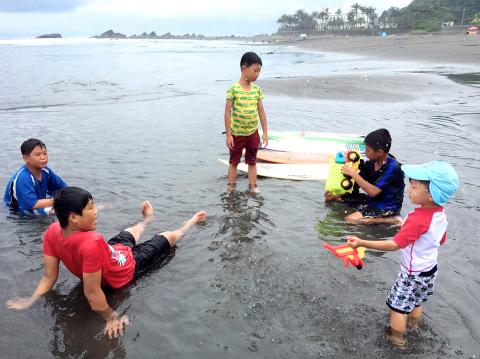When American expat Brent Calkins started surfing in Taiwan four years ago he immediately fell in love with the sport.
“When you’re in the ocean sitting on a surfboard with [the coast and mountains] as your backdrop, there aren’t many things that can beat it,” says Calkins.
Lately, he’s become proactive about promoting environmental awareness, too. Calkins and local surfer George Tsai (蔡喬治) of SuperGeorge Surf Taiwan (喬治衝浪), a surf shop in Yilan County, will be hosting a Trash Art Contest for elementary school students at Double Lions Beach (雙獅海邊) near Waiao Train Station (外澳火車站) tomorrow morning as a tribute to World Oceans Day on Wednesday.

Photo courtesy of Taiwannasurf
It was Tsai’s idea to get the students from Toucheng Humanities Elementary School (頭城人文國小) involved. The children, who are in the fourth and fifth grades, will collect as much trash from the beach as possible and make art out of it. There will be prizes for first, second and third places. In the afternoon, the students will also get a chance to swim and surf. The day will culminate with an awards ceremony.
Anyone is invited to join and help out, though it’s only the students who will be participating in the actual contest. Calkins and Tsai are also looking for surfers to teach the children how to surf.
Litter from cities often ends up on beaches and coastlines and flows into the ocean, so Calkins says the goal of the event is to educate children about the ramifications of throwing trash on the ground, notably how the act is harmful to our ecosystem and to us.
“Once they see a dead seagull with its stomach full of plastic, once they see the trash on our beaches, once they know how good it feels to clean a beach and do their part, they will be positively changed forever, and then they will become the teachers,” Calkins tells the Taipei Times.
One way to change people’s attitudes and make them realize the importance of keeping the environment clean is through exposure to beach culture, including playing at the beach and learning how to swim — and all of this begins at an early age.
During martial law, most of Taiwan’s coastline was sealed off from public access and as a result, many Taiwanese grew up fearing the ocean, seeing it as a dangerous place that was used for military drills.
This has changed in the past decade though, with more and more beachgoers populating the black sand beaches on Taiwan’s east coast every weekend. In fact, more children are learning how to swim, either at school or on their own. Some are even learning how to surf.
Calkins is also the founder of Taiwannasurf (台灣哪衝浪有限公司), a soon-to-be-launched bilingual Web site and app that provides up-to-date surf reports and forecasts for surfers, as well as information on surf shops and hostels.
The Web site will also have an educational component with information about ocean awareness and how to take care of the environment. The decision to include this component was partly driven by how Calkins has always loved nature and was disheartened to see so much trash end up on Taiwan’s beaches — which is why he is happy about the event.

Late last month Philippines Foreign Affairs Secretary Theresa Lazaro told the Philippine Senate that the nation has sufficient funds to evacuate the nearly 170,000 Filipino residents in Taiwan, 84 percent of whom are migrant workers, in the event of war. Agencies have been exploring evacuation scenarios since early this year, she said. She also observed that since the Philippines has only limited ships, the government is consulting security agencies for alternatives. Filipinos are a distant third in overall migrant worker population. Indonesia has over 248,000 workers, followed by roughly 240,000 Vietnamese. It should be noted that there are another 170,000

Hannah Liao (廖宸萱) recalls the harassment she experienced on dating apps, an experience that left her frightened and disgusted. “I’ve tried some voice-based dating apps,” the 30-year-old says. “Right away, some guys would say things like, ‘Wanna talk dirty?’ or ‘Wanna suck my d**k?’” she says. Liao’s story is not unique. Ministry of Health and Welfare statistics show a more than 50 percent rise in sexual assault cases related to online encounters over the past five years. In 2023 alone, women comprised 7,698 of the 9,413 reported victims. Faced with a dating landscape that can feel more predatory than promising, many in

“This is one of those rare bits of TikTok fitness advice with a lot of truth behind it,” says Bethan Crouse, performance nutritionist at Loughborough University. “Sometimes it’s taken a bit too literally, though! You see people chugging protein drinks as they’re scanning out of their gym.” Crouse recommends the athletes she works with consume 20-30g of protein within 30-60 minutes of finishing a resistance training session. “The act of exercising our muscles increases the breakdown of muscle proteins,” she says. “In order to restore, or hopefully improve them — and get gains such as increased muscle mass or strength —

“Far from being a rock or island … it turns out that the best metaphor to describe the human body is ‘sponge.’ We’re permeable,” write Rick Smith and Bruce Lourie in their book Slow Death By Rubber Duck: The Secret Danger of Everyday Things. While the permeability of our cells is key to being alive, it also means we absorb more potentially harmful substances than we realize. Studies have found a number of chemical residues in human breast milk, urine and water systems. Many of them are endocrine disruptors, which can interfere with the body’s natural hormones. “They can mimic, block